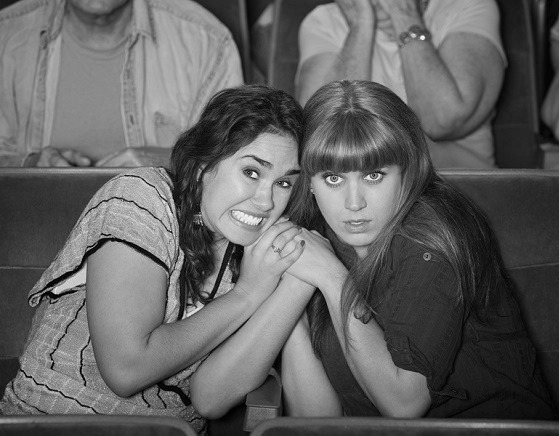Do Work That Makes You Cringe.

Have you ever been involved in an effort to organize a room in your home and tripped across an old journal?
If you’re anything like me, you have, and you use this discovery as a perfect distraction from said organizing. You flip open the journal and read a few entries, your face melting and contorting in humiliation, mouth agape, until pretty soon you become convinced that the ghost Edvard Munch is going to walk in and set up an easel across from you at any moment.
This retrospective look at past seasons of your life is painful and awkward from your current vantage point for one reason: you’ve grown.
This is one of the hardest lessons creatives must learn: if we’re doing it right, the work we put out today will leave us taken aback by the sheer cringiness of it all in a year. It may be barely tolerable in five. But that doesn’t mean what we put out into the world today doesn’t have value, and it most certainly doesn’t mean we should refrain from putting it out there altogether.
It’s critically important to put your best work out there, continually, because when you look back on it, you will see that you have gotten better. From your new, more practiced and polished perspective, your earlier work should, by comparison, seem like the equivalent of a proud five-year-old’s Play-Doh creation with all the colors mushed together to form some sort of bulbous brown thing.
Yet in the same way you wouldn’t hate on that lumpy brown masterpiece, you should not hate on your own lumpy creations. Look at them — and by all means, laugh at them — and then use them as a benchmark to measure how far you’ve come. Generally, the more ridiculous you feel about your past work, the greater your growth has been. And that’s something to celebrate.
Once you do all of that, do it again. There’s only one way to get better at creative work, and that’s by actually doing the work. Leave no post unwritten, no painting sitting in the closet, no business plan collecting dust.
This is the hard truth that Aristotle summed up oh-so-poetically (or rather ethically, for my Aristotle peeps out there): “For the things we have to learn before we can do them, we learn by doing them.” All of the work has value because all of the work is getting you where you are going.
And with the exception of those few rare prodigies (if you’re reading this, I hate to tell you that you probably aren’t one), there’s no skipping steps.
All of this is a huge pain in the ass for a person who spent most of her life convinced that she could do anything by reading the manual. My brain really likes itself and likes to hang out with itself as much as possible. But here’s the rub: doing — as in executing — a thing is not the same as learning about doing a thing.
You can learn how to assemble the IKEA table by reading the directions, but reading the directions won’t assemble the table. And it certainly won’t design a new, better table.
I know what you’re thinking, That’s all well and good, I understand the ‘what’, when are you going to talk about the ‘how’? Now. Right now.
There is a psychological concept that I love called the Confidence/Competence Loop that holds the answer.
I think we can agree that we generally have better success at things we are good at, and we’re more confident in our ability to do things we already know how to do. However, we often stop there and don’t dive any further into the ramifications of this truth: when we’re confident, we’re better positioned — and often more willing — to push the boundaries of our competence.
When we succeed in these boundary-pushing endeavors, it increases our competence, which in turn raises our confidence. A cycle is born out of the truth that one fuels the other. However, neither can do so without a force first acting upon and disrupting the inertia.
For example, your competence in becoming a sculptor doesn’t increase by thinking about sculpting (often this can have the opposite effect). And without creating a sculpture, there’s nothing tangible to be confident about. Both competence and confidence remain in a state of inertia until acted upon.
Experiments have been done on sets of dominoes where each domino was roughly one-and-a-half-times larger than the preceding domino. With just 13 dominoes, one study concluded that the kinetic energy of the first domino tipped was just two-billionths of the amount released by the last domino.
The researchers stated that if there had been 29 dominoes and the first was the size of a Tic Tac, the last would have been as tall as the Empire State Building. My point, besides citing a nifty piece of physics research, is that it only takes a small kinetic force to act upon inertia. Action, even Tic Tac-sized action, is the first domino.
Through the cyclical process of force amplification, each turn of the Competence/Confidence Loop has a greater effect on the next. For the future sculptor, that first Tic Tac-sized domino might be buying some clay. For the novelist, typing the first sentence. For the entrepreneur, filing the LLC documents.
To my fellow brain-dwellers out there who are reading this and trying to come up with all of the reasons why I’m full of it, let me stop you right there. Love of learning is my core strength — the one that flies 30,000 feet above all the others. I’ve spent years thinking up those same reasons only to discover, to my chagrin, that they’re all crap.
Love of learning may be your Number One strength too, but if you’re a creative, I’m willing to bet you’ll feel unfulfilled until you apply that learning in some way. Knowing something for the sake of knowing it is great, my darling Jeopardy contestant wannabes, but when it comes to the work, the joy is in the learning but the fulfillment is in the doing.
As much as it pains my nerd brain to say, the only way to get better at creative work is to create more work. For this reason, I really hope future me thinks this piece of writing is trash. Bonus points if I groan at the Aristotle joke.
***

Angela Schenk is a coach, writer, thinker, feminist, and bold introvert. She’s a life-long learner whose areas of study and work include personality theory, positive psychology, narrative impact and storytelling, and having a positive impact on the world. She believes that Quiet Creatives will save the world, and strives to help as many of them succeed as she can. Learn more about Angela at her website.

